Recommendations
More recommendations
-
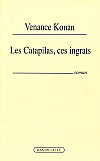
Les catapilas, ces ingrats
Venance Konan. Les catapilas, ces ingrats. París: Jean Picollec, 2009.
Les Catapilas, ces ingrats is the latest novel by the most popular writer in Côte d'Ivoire. Venance Konan uses fiction to review the recent history of Cote d'Ivoire, including coup attempts, the crisis of 1999 and the armed rebellion of 2002, while focusing on what he considers to be the key question in Ivorian politics: identity and the rejection of foreigners.
The story is based around the character of Robert, a man in his fifties who is elected president of the youth in an ordinary village on the coast of Côte d'Ivoire. Like many native Ivorians, Robert has sold his land to immigrants to the country. These foreigners are the Catapilas of the title, because their farming skills are reminiscent of the famous Caterpillar tractors and machinery. The dispute over land ownership when the economic crisis arrives begins to poison coexistence, as has been the case in Côte d'Ivoire over the last decade. Venance Konan uses humour and sarcasm to depict a village in which everyday life – weddings, funerals, getting together to watch a football match, a beer in the bar – is gradually polluted by the political conflict between the governing party and the opposition.
Les Catapilas, ces ingrats is the second novel in which Venance Konan examines what he calls "the foreigner issue" using the same backdrop and same characters (the previous novel, Robert et les Catapilas, was published in 2005). The author is a strong advocate of tolerance, and reminds us that everyone, in Africa and elsewhere, is a foreigner at some point. And that the problem in his country is that the lessons of past crises have not been learned, and that politicians continue to manipulate the issue of identity in their own interests.
C.C.
-
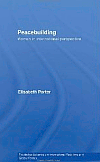
Peacebuilding
Elisabeth Porter. Peacebuilding. Women in Internacional Relations. Nova York: Routledge, 2007.
The author argues that the construction of peace can be seen in a broader sense than the way in which it is usually framed at the United Nations. With this book, she aims to highlight some key ideas and practices in the construction of peace, considered in its broadest sense as a range of formal and informal processes that occur during pre-conflict, conflict and post-conflict situations.
From this point of view, the work of women in conflicts and societies in transition can be assessed as contributions to the construction of a sustainable peace based on justice. Despite Porter's argument that the construction of peace is relevant to men and women, she decides to emphasise women's experience in the construction of peace in various international situations, highlighting the lessons that can be learnt from the good practices in the construction of peace based on SCR 1325 on Women, Peace and Security.
The author constructs her argument based on the theoretical perspective of peace and conflict studies, international relations, political theory and feminist ethics, and concludes that the inclusion of women in decision-making in societies in transition entails a major commitment to gender justice, equality, human rights for women and the reconstruction of relations in demilitarised societies. The construction of peace must be truly inclusive of women and men in all aspects of life if reconciliation is to be something more than a slogan.
E.G.
-
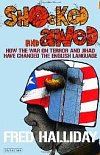
Shocked and Awed
Fred Halliday. Shocked and Awed: How the War on Terror and Jihad have Changed the English Language. Tauris, 2010.
Fred Halliday, emeritus professor of International Relations at the London School and ICREA lecturer at the IBEI (Barcelona Institute of International Studies) died in April 2010. His friends, colleagues and students from around the world have written a great deal (see opendemocracy) about his contributions on a human and intellectual level: twenty books written, knowledge of ten languages, a taste for teaching and conversation, analytical non-conformism and critical ability, and a commitment to thorough research.
Shocked and Awed. How the war on the terror and jihad have changed the English language, London: Tauris, 2010) is a posthumous book, submitted for publication before his death, and a valuable contribution to understanding in dictionary format, in 12 chapters (ranging from US Intelligence and 11 September to the euphemisms of war, such as "collateral damage", taking in jihad, Israel and Palestine and the use of the exculpatory passive form of verbs). It is a magnificent work that includes research and fact gathering (linguistic items and expressions really used and gathered over seven years), an accurate contextual analysis of the expressions and a particularly painstaking theoretical and interpretative framework. In specific terms, as the author says in the introduction, it is a study of the relationship between power and words, and how language is used to attempt to control events and facts, and a study of the order and disorder of words. To quote literally, "that those who seek to control events, people and their minds also seek to control language is a truism on politics, as it is of the major religions." What is interesting and what the book shows is the attempt to control all of this, with the same level of failure, is as prevalent among those who oppose the states who do so. It is a great book, which once again shows how much we still miss Fred. Thank you for this gift which I believe will not be the last. Make an effort to read it, and enjoy it while you learn.
R. G.
-
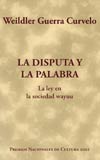
Disputes and words
Weildler Guerra Curvelo. La disputa y la palabra. La ley en la sociedad Wayuu. Bogotà: Ministerio de Cultura, 2002.
For the Wayuu, an indigenous people of Colombia and Venezuela, disagreements between individuals and groups are not necessarily undesirable or symptoms of a social pathology. Indeed, they are considered as recurring events that are inherent to community life, and the conflict resolution process is perceived as an opportunity to improve social relations. This process takes place by means of palabreros or pütchipü'ü, who are specialists in resolving disputes using words.
The author explains how the palabreros use effective rhetoric to maintain social harmony with no need for police involvement, the use of force or other coercive mechanisms. It emphasises that Wayuu justice is restorative rather than punitive. The book also looks at the coexistence and tensions between this traditional system of resolving disputes and the application of national legislation.
The Wayuu legal system has recently been declared part of the Intangible Cultural Heritage of Humanity by UNESCO. The ICIP took an interest in the subject, and organised a talk with Weildler Guerra and other specialists on indigenous peoples and conflict resolution on 26 November.
The author, a renowned Colombian anthropologist and ex-secretary for indigenous affairs in the Department of La Guajira, also has Wayuu indigenous roots and is related to palabreros. As well as the quality of his ethnographic studies, his roots and his links with the community studied means that reading a book is essential for experts and will arouse the interest of novices.
The book La disputa y la palabra. La ley en la sociedad Wayuu. [Disputes and words. Law in Wayuu society] is available at the ICIP Documentation Centre.S.P.
-
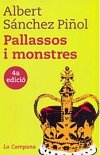
Clowns and monsters
Albert Sánchez Piñol. Pallassos i monstres. Barcelona: La Campana, 2000. 4a edició.
This anthropological essay is perhaps more well-known due to its author's literary reputation, and shows the darker side of eight individuals who do not deserve to be remembered by history that should not be forgotten. It does so with a degree of narrative skill that sometimes makes you feel guilty about enjoying reading it. This is because you are enjoying it while you are learning about the deterioration of the situation in Africa after decolonisation and its responsibilities, which also affect us. At this point, the book's message becomes more specific. For example: before colonisation, there was no hunger in Africa on the scale that we see it today.
Clowns and monsters is a book that is unfortunately always timely. The clown monsters because these dictators are all both things) depicted by Albert Sánchez Piñol are real. And perhaps that is why the tragic aspect of the book is much more important than its comic side, which it must be said makes it easier to read. This comic touch causes the reader to smile, while anger fills one's entire body as we learn about extreme cruelty, surreal situations and incompetence disguised as fear and ignorance. This is in addition to the acquiescence, support or even interests of the so-called first world countries, who are interested in looking after economic and geostrategic interests that benefit the few, while their rhetoric about the defence of democratic freedoms and human rights fades away as time passes.
Perhaps the book leaves an impression of Africa that is too negative and too pessimistic, and perhaps needs to be complemented with other views and other stories, because political science has for some time suggested that a dictator cannot survive in the long term without the support of a reasonable proportion of the population. If that is the case, it will be interesting to find out the positive aspects of the government (if it can be described as such) of the clown monsters who spent their time torturing and massacring their populations. In any event, in a fascinating and essential piece of historical memory, the author reminds us that not very far away (either in time or in space), cruel and an exceptional dictators created reigns of terror with everyone's complicity. Could it happen again?
J.A.
-
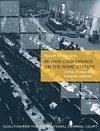
Report on the first Review Conference on the Rome Statute
http://www.iccnow.org/documents/RC_Report_finalweb.pdf
The Coalition for the International Criminal Court publishes its report on the Statute of Rome Review Conference
The first Statute of Rome Review Conference, a major event in the development of international justice, took place between 31 May and 11 June 2010 in Kampala (Uganda).
Experts in international justice from 115 governments, high-ranking representatives of the United Nations and special and ad hoc international criminal courts, journalists, academics and over 600 representatives from almost 150 NGOs from all over the world met to consider the possible amendments to the Statute of Rome and proposals for improving the work of the International Criminal Court. Representatives of the ICIP also attended.
Five months later, the Coalition for the International Criminal Court, a platform consisting of over 2,500 NGOs in 150 different countries, published its Report on the first Review Conference on the Rome Statute to explain the proposals and provide an overview.
Despite dealing with highly complex issues, the coalition explained each of the points covered and agreed at the conference in detail, in a highly comprehensive and easily understandable way, even for readers without a legal grounding.
S. P.